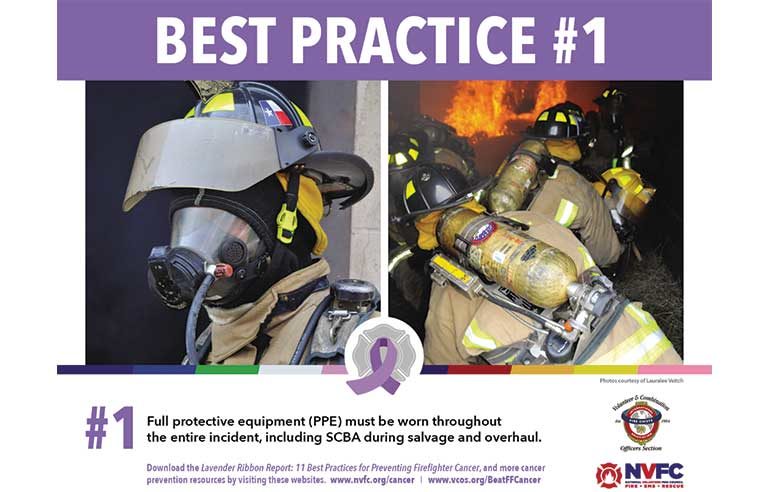New posters highlight 11 best practices for lowering firefighter cancer risk

Greenbelt, MD — Following up on their release of a report detailing 11 best practices for minimizing cancer risk among firefighters, the National Volunteer Fire Council and the International Association of Fire Chiefs’ Volunteer and Combination Officers Section have unveiled new posters to highlight each practice.
The posters, according to an Aug. 27 press release, are part of the organizations’ continued initiative to educate firefighters on the risks of work-related cancer and encourage action. In August 2018, the organizations released the Lavender Ribbon Report, which states that firefighters are at an increased risk for multiple types of cancer compared with the general population.
| Sign up for Safety+Health's free monthly email newsletters and get the news that's important to you. |
Among the best practices are:
- Wear full personal protective equipment throughout the duration of incidents, including self-contained breathing apparatus during salvage and overhaul operations.
- Change and wash clothes as soon as possible after exposure to products of combustion or other contaminants. Isolate used clothes in a trash bag if washing facilities are not immediately available.
- Shower as soon as possible after exposure to products of combustion or other contaminants, ideally within one hour.
- Get an annual physical.
- Include fully documented fire or chemical exposures on incident reports and personal exposure reports.
“The new posters can be hung up at the station to remind firefighters of the actions they need to take to protect themselves and their crew,” the release states. “Departments can also use the poster images in social media, newsletters and other correspondence with their members as periodic safety reminders.”
Post a comment to this article
Safety+Health welcomes comments that promote respectful dialogue. Please stay on topic. Comments that contain personal attacks, profanity or abusive language – or those aggressively promoting products or services – will be removed. We reserve the right to determine which comments violate our comment policy. (Anonymous comments are welcome; merely skip the “name” field in the comment box. An email address is required but will not be included with your comment.)

